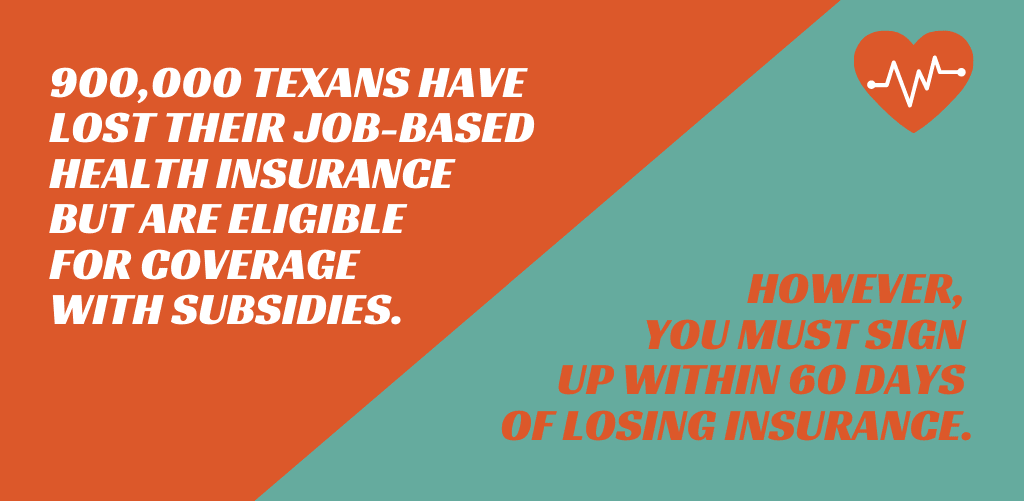COVID-related job-losses are truly staggering. Texas’ unemployment rate for April was 12.8%,the worst on record, and up from 3.5% in January and February. Since mid-March, more than 2.2million Texans have filed unemployment claims, and this number is still growing.
For many Texans, losing a job or having your hours cut also means losing job-based health insurance. Before COVID, 13 million Texans had job-based health insurance – roughly half of Texans under age 65 (53%). As job losses mount, so will the number of uninsured Texans. Even before COVID, Texas had both the largest uninsured population (5 million Texans) and the highest uninsured rate (18%).
Two recent reports — one from the Kaiser Family Foundation and another from the Urban Institute — have started to shed light on the scope of health insurance losses in Texas. Their findings are sobering. Here are key takeaways:
A large and growing number of Texans have lost job-based insurance during the pandemic.
-
1.6 million Texans have already lost job-based health insurance because of a job loss in the family between March 1 and May 2 (KFF).
-
Coverage losses could go much higher. The Urban Institute projects that if Texas hits a 20% unemployment rate, 2.3 million Texans will lose job-based insurance. At 25% unemployment, 3 million will lose job-based insurance.
Across all states, Texans are the least likely to get other coverage after losing job-based insurance.
-
Half of Texans who lose job-based insurance will end up uninsured (Urban Institute). These are grim odds. In fact, Texans losing their job-based insurance face the longest odds in the nation of getting alternate coverage in Medicaid, the Marketplace, or other private coverage.
-
In states that have expanded Medicaid, only 23% of people losing job-based insurance end up uninsured. Texas does poorly even when compared just to the other states that have not expanded Medicaid. In the other 13 non-expansion states, on average 37% of people losing job-based insurance will become uninsured. Again, in Texas, it’s 50% (Urban Institute).
Many Texans who’ve lost job-based coverage can temporarily sign up for reduced-price insurance at HealthCare.gov.
- Nearly 900,000 Texans who’ve lost job-based insurance are eligible for coverage with subsidies at HealthCare.gov (KFF). However, they must sign up within 60 days of losing their insurance. The HealthCare.gov special enrollment window will close on June 29 for people who lost jobs in April and job-based insurance at the end of April.
The number of Texans trapped in the Coverage Gap will swell as unemployment benefits expire.
-
For now, unemployment insurance benefits are keeping many Texans who’ve lost jobs from falling into poverty, but benefits expire after 39 weeks. When unemployment benefits expire, the Kaiser Family Foundation estimates that an additional 382,000 Texas adults will fall into the Coverage Gap, meaning they earn too much to qualify for Texas Medicaid—because state leaders have not accepted Medicaid expansion funding to cover low-income adults—yet too little to qualify for subsidies at HealthCare.gov.
-
The Kaiser Family Foundation reminds us that only rough projections can be made using 2018 Census uninsured data and estimating the impact of 2020 job losses on January 2021 uninsured numbers. Still, using KFF projections (here and here), Every Texan estimates that the total number of uninsured adult Texans who could gain coverage if Texas leaders accept Medicaid expansion funding will swell from the pre-COVID-19 level of 1.5 million to over 2 million by January 2021.
These grim numbers illustrate why advocates have called on elected leaders to ensure that improving access to coverage is part of our state’s and nation’s COVID-19 response.
Having health coverage matters. It improves financial security and access to health care. People who are uninsured are more likely to delay or skip needed care due to cost and more likely to struggle to pay their medical bills. Efforts to control the spread of COVID-19 and reduce fatalities will be less effective if Texas has a ballooning uninsured population that fears seeking testing or treatment because of costs. Our health depends in part on the health of others. This has always been true, but COVID-19 has made this connection far more evident.
Note: The two studies look at different, but related, questions. The Urban Institute study projects how many people will lose job-based health insurance and what alternate coverage, if any, they will actually enroll in. The Kaiser Family Foundation, on the other hand, estimates how many people have lost job-based insurance and whether they are eligible for other coverage in Medicaid or the Health Insurance Marketplace. The number of people who actually enroll in coverage is always less than the number eligible because there are many barriers to enrollment, even when people aren’t struggling with job loss, loss of child care, and a public health emergency.
